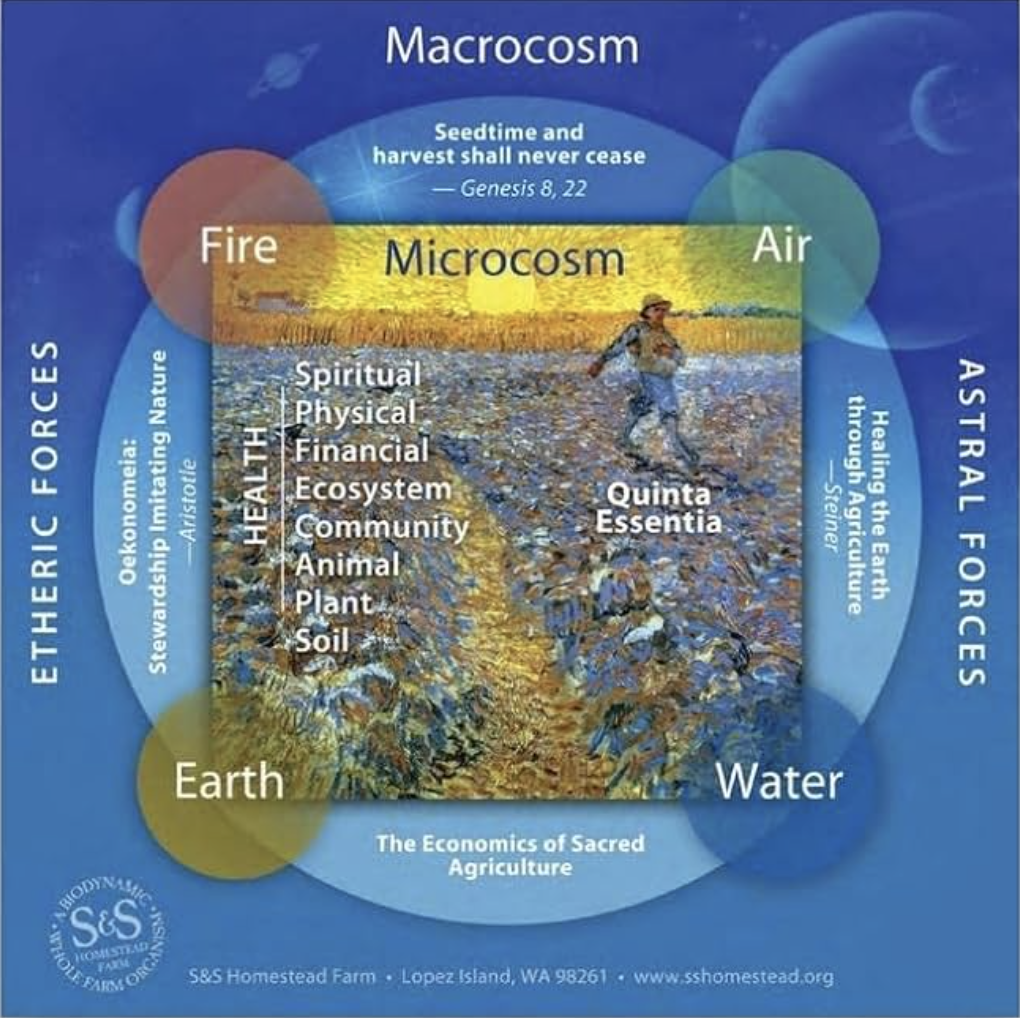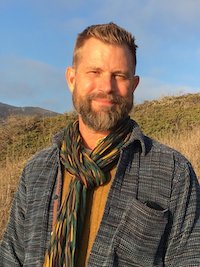
By Mark Voss
Available for purchase from the Josephine Porter Institute for Applied Biodynamics.
I first met professor-farmer-researcher-author Henning Sehmsdorf in 2012 when my family and I responded to a call for homestays during the 2012 Biodynamic Farming Conference, held that year in my city of Madison, Wisconsin. During his stay at our urban farmstead, Henning regaled my family and me with stories of S&S Homestead Farm, his Lopez Island CSA in the Salish Sea of Washington state. Images of his farm from his stories have inspired me in my farming ever since. And so I was delighted to have a reunion with Henning at the 2023 Biodynamic Farming Conference in Westminster, Colorado, and to learn of his recently published book, Fifty Years of Biodynamic Farming: Essays From the Field. I purchased it at the Josephine Porter Institute book table, Henning signed it, and I devoured it over the winter months (mostly in the sauna), pen and highlighter in hand.
The book is an extensive essay collection that weaves the story of a whole farm organism, the farmers who co-create on the land, and the diverse community the farm serves. The essays are divided into seven topic areas that reflect a comprehensive lens of an aspirational biodynamic farm organism: “Biodynamics,” “Living the Holistic High-Life,” “Growing Plants,” “Growing Animals,” “Building Things,” “Economics,” and” World View and Holistic Science.”
Sehmsdorf’s authored essays range from deeply personal to academic, philosophical to poetic. In his most personal essay, which opens the collection, the author reflects on his life as a German immigrant who came to the United States at age nineteen after WWII, working in a meat-packing plant by day and attending community college at night. The experiences of the sacredness of food during his post-war childhood, juxtaposed with the cruelty of the kill-floor at the meat plant, created a deep resolve in him to raise his own food spiritually and ecologically. In tandem with his personal story, the author presents a thorough and accessible treatment of Rudolf Steiner’s biography as he describes his own adoption of biodynamics as an authentic ecological farming practice.
The author’s wife and farming partner, Elizabeth Simpson, penned several of the essays featured in the book. In addition to farming, Simpson taught English at the Lopez Island high school and co-created the Ecological Food Production class with the farm as its classroom. Many of her students took the class up to three consecutive semesters. As a retired teacher who sponsored school gardens and taught garden-based seminars myself, the essay “Teach Your Children Well” was music to my ears.
Community members, former students and interns, agricultural extension agents, and researchers round out the authorship of this historical farm record and resource. One such essay, entitled “Biodynamic Farming and Goethe’s Concept of Plant Morphology,” is written by former Ecological Food Production student and farm intern Kelley Palmer-McCarty. This entry, which appears in “Part VII: World View and Holistic Science,” is a thorough treatment of the impact S&S Homestead Farm had on her world view and development as a farmer and scientist. The farm organism, along with Henning and Elizabeth’s support, became a pathway for deep exploration and practice evolution. She explains observations and intense record-keeping that cultivated imagination and perception of the archetypal plant.
In the last essay of the book, “The Spirituality of the Soil: The Idea of Teleology from Aristotle to Rudolf Steiner,” author Sehmsdorf shines as a spiritual academic. He examines Aristotle’s concept of entelechy (a word I recently learned from another native German-speaking aspirant, Sabine Lichtenfels, in her book Sources of Love and Peace, Morning Prayers, published by Verlag Meiga). Sehmsdorf quotes Aristotle’s notion of entelechy as “any created thing or living being fully manifesting its intended end…Movement is work or evolution that allows a living thing to realize its inner potential or purpose.” Sehmsdorf, his partner Simpson, and S&S Homestead Farm have been evolving into their entelechy together for fifty years.
Sehmsdorf’s reflections on Fifty Years is not simply a look in the rearview mirror, but a purposeful examination of the road ahead. In the essay “Retiring on the Commons”, which appears in “Part VI: Economics,” the author explores various approaches to retirement in relationship with the continuing development of the farm as a “self-supporting, ever-evolving organism providing a livelihood for people, animals, and plants to its fullest potential.” I am particularly encouraged by Sehmsdorf and Simpson’s innovative model and inclusive approach to farm succession.
As we celebrate 100 years since Rudolf Steiner gave his Koberwitz lectures, Spiritual Foundations for the Renewal of Agriculture, it is fitting that we now also have a fifty-year history of Steiner’s renewal of agriculture in practice on S&S Homestead Farm to celebrate. This book offers a thoughtful and mindful approach to biodynamic farming with deep community connection. It promises to enrich the understanding of anyone interested in stewarding the Earth.
 Mark Voss is a retired public school teacher and the founding farmer of Voss Organics, an urban farm and nursery in Madison, WI. He was introduced to biodynamics by Ruth Zinniker during his farming apprenticeship in 1994, where he learned about the inseparable connection of land, community, cosmos, and spirit. In addition to his urban farm operation, Mark is a partner at Latitude Regenerative Real Estate. His passion is working with organic and biodynamic farm succession plans to find new stewards in order to facilitate retiring farmers’ and farms’ continued thriving.
Mark Voss is a retired public school teacher and the founding farmer of Voss Organics, an urban farm and nursery in Madison, WI. He was introduced to biodynamics by Ruth Zinniker during his farming apprenticeship in 1994, where he learned about the inseparable connection of land, community, cosmos, and spirit. In addition to his urban farm operation, Mark is a partner at Latitude Regenerative Real Estate. His passion is working with organic and biodynamic farm succession plans to find new stewards in order to facilitate retiring farmers’ and farms’ continued thriving.
